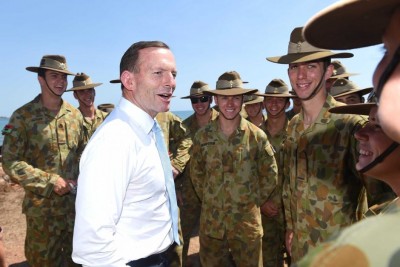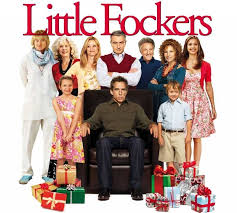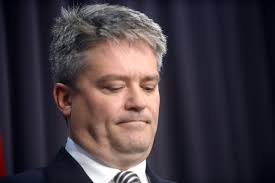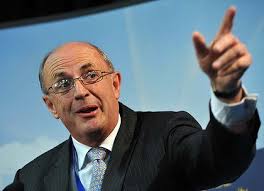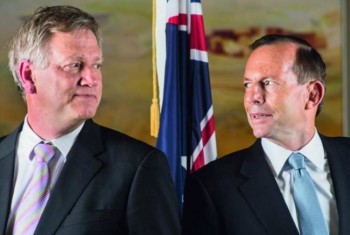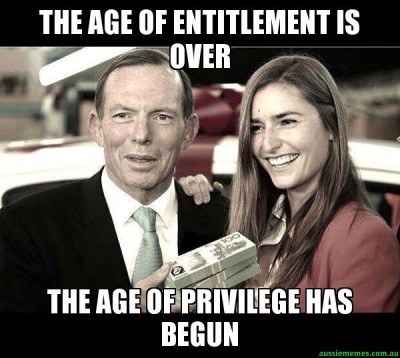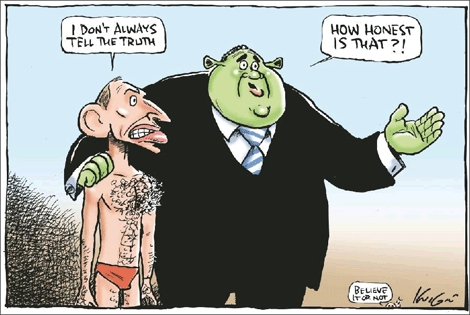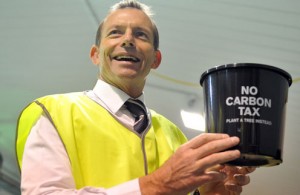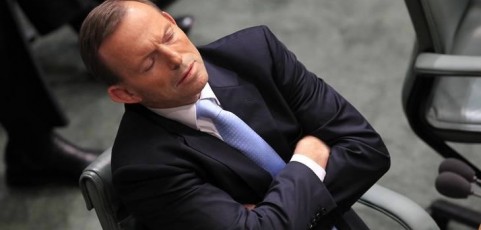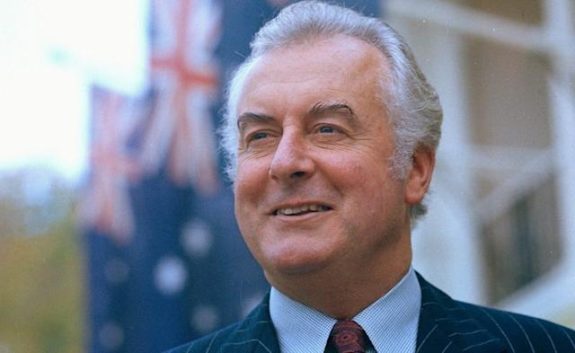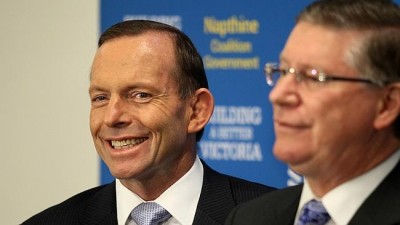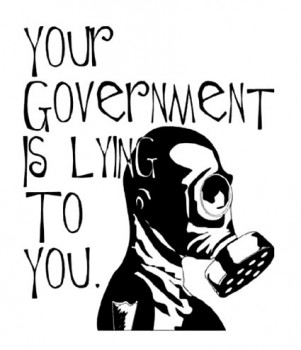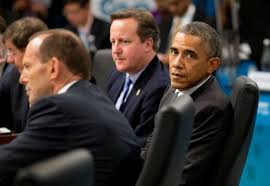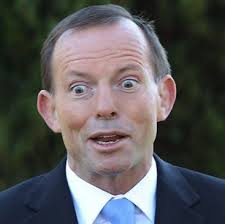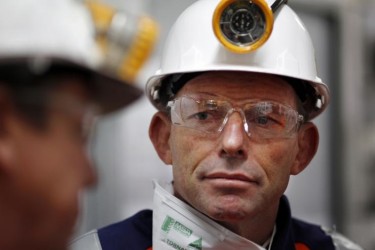Tony Abbott and Joe Hockey have been at pains to tell us it’s all about “jobs and growth”. Now that we have “a number” the economies of the world will be saved. But how do we intend to reach this magical figure of “2% growth above what is expected”?
The government’s action plan has listed five “key commitments” to underpin its pledge.
The first key commitment to expanding economic activity is infrastructure spending, including its “asset recycling initiative” – encouraging state governments to privatise assets and then plough the proceeds into new projects.
Considering we are selling the profitable Medibank Private to invest in railways for dubious Indian coal mining ventures, this seems an avenue to privatising profits and socialising losses. No doubt some Liberal Party donors will do well out of it.
“Employment welfare reforms” is ranked as the No 2 commitment, and notes that the changes will “strengthen participation and activation strategies”.
By cutting payments entirely to some unemployed and requiring jobseekers to search for more jobs to qualify for payments, the government argues it will spur the unemployed to look for work rather than live on welfare, thereby boosting economic activity.
But that boost can only come if there are jobs for the unemployed to get and there seems little in the way of a plan to create jobs beyond “axe the tax” and “build some roads”.
Anglicare Australia commissioned a report called “Beyond Supply and Demand” which rubbished the Abbott government’s treatment of the long-term unemployed, calling for a “life first” rather than a “work first” approach to end joblessness.
Anglicare executive director Roland Manderson said
“It’s a problem if the public debate hinges on an assumption that people can just try harder and get work, that’s not true. What is true is that people can get work and develop really great work but you need to put that investment in at the front end. The problem with the ‘earn or learn’ (budget measure) is it makes the assumption that any training will do the trick. It’s disempowering to train people who might find work for a short time, but then are out of work again because they haven’t worked through their life barriers.”
Labor assistant treasury spokesman Andrew Leigh said cuts to welfare payments such as the unemployment benefit, family tax benefits and the pension would act to suppress economic growth.
“If you produce a budget that reduces the income of the poor, it has an impact on consumer demand because they spend everything they’ve got,” he said. “That will detract from economic growth.”
The other key commitments are “cutting red tape”, “contributing to global trade liberalisation” and “creating self-reliant industries”.
If one thing came out of the many millions spent on inquiries into the Home Insulation Program, it was to underline the dangers of “cutting red tape” and oversight.
The most obvious result of this commitment is to fast track development and mining approvals without regard to environmental impacts, and to remove rights of appeal.
The detail of the China Free Trade Agreement, or Memorandum of Understanding to be more accurate, is yet to be released so it is difficult to assess its impact but one concession we made was to allow Chinese companies to bring in their own workers. I’m not sure how selling our assets to foreign companies who send their profits back home and who employ foreign workers will actually boost our economy.
Andrew Robb also admitted that Treasury has not done modelling on the overall impact of this agreement and he does not know how it will affect our balance of trade.
The commitment to “create self-reliant industries” seems to fly in the face of Abbott’s staunch resistance to reducing fossil fuel subsidies. And how does Newman’s Galilee railway and Hunt’s Emissions Reduction Fund fit into that plan?
As was forcibly pointed out over the weekend, renewable energy is an industry of the future, but rather than taking advantage of the billions available for investment in this area, Abbott seems determined to kill off this industry and the tens of thousands of jobs that go with it, presumably because it offers competition to those humanitarian coal producers and users.
Which seems strange as the Coalition’s plan for more jobs is based on improving productivity and competitiveness.
Across the globe, mining productivity has declined by 20 per cent over the past seven years, despite the push for increased output, and declining market conditions.
Efficiency in the Australian mining industry has received a stern rebuke from PricewaterhouseCoopers (PwC), rated as one of the least productive regions in the world.
The damning report ‘Mining for Efficiency’ states that Australia is the second least productive mining region in the world, with Africa taking the wooden spoon, and North America beating Australia on all classes of equipment.
The report claims there is an inherent conflict between the productivity plans of the mining boom which were based on increased volumes, and plans based on cost reduction which are now coming to the fore of business strategy.
Despite claims by industry lobby groups that high wages in Australia will impact on our competitiveness, results actually show “significant divergences” between mines in close proximity chasing the same minerals under the same industrial relations conditions.
Equipment and the way it is used is a key focus of the report, which shows that productivity differences between the best and worst performing mines are stark, with some of the best practice outputs coming in at more than 100 per cent greater than the median performers.
“The popular tagline of the mining sector is that the miners are serious about productivity,” PwC states.
“We suggest that most are reducing costs and increasing volumes but there are precious few with legitimate claims to improving core productivity in their open cut operations.”
Comments in the report echoed the new fashion for cost reduction employed by the major miners who continue to sell off ‘non-core’ assets, such as BHP Billiton had done earlier this year with Nickelwest operations.
“Miners are banking the first available dividend, selling or segregating mines deemed too hard to fix and tempering expectations of further productivity gains by citing a combination of labour laws, high costs, regulatory hold ups and mine configuration constraints,” Lumley said.
And then this morning, we are hit with the news that the axe has fallen again at Australia’s research agency, the CSIRO, with another 75 researchers retrenched across the organisation’s future manufacturing, agriculture and digital productivity programs.
All three affected areas belong to the CSIRO’s flagship “impact science” division, set up in 2003, which aims to partner with universities and the private sector to bring “large scale and mission directed science” to bear on major national priorities.
Future manufacturing research will be hardest hit, losing up to 45 full-time positions, including in advanced fibres, biomedical manufacturing and high-performance metals.
Among the work to which future manufacturing research scientists have contributed is state-of-the-art ceramic body armour for Australian soldiers, the southern hemisphere’s first Arcam additive manufacturing facility, which enables 3D printing of metals, and a spray-on topcoat for aircraft.
But this shouldn’t surprise us from a government who thinks coal is the industry of the future and a Treasurer who thinks that climate change is “absolutely not” an impediment to economic growth
